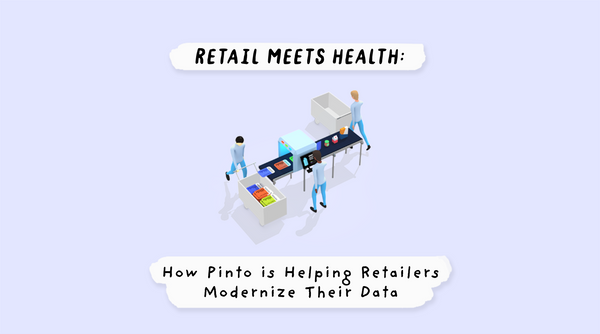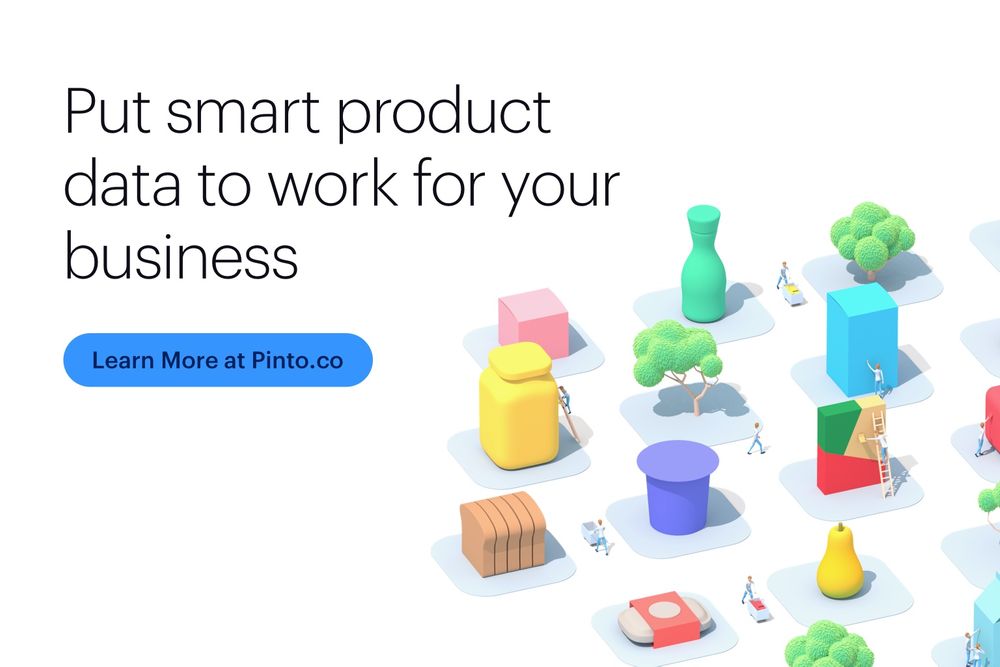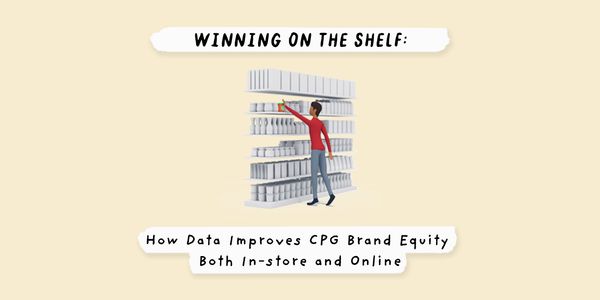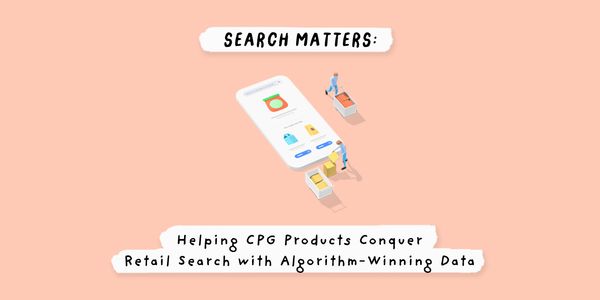- Strong data health is critical for a modern retailer to be successful — it’s the basis for building modern, personalized customer experiences, and enables innovative retail programs that can adapt to changing consumer and data needs.
- “Unhealthy” datasets give incomplete, inconsistent, and unreliable information on important product details such as allergy and ingredient information, dietary preferences, and nutritional needs. This inconsistency creates barriers to building modern technologies and stunts digital programs before they start.
- Pinto believes in data health, where data assessments are continually conducted on catalogs to ensure retailers are presenting complete, up-to-date, cohesive information across their inventory.
- By providing smart tools and deep datasets, Pinto improves product catalogs and consumer experiences, all while setting retailers up with the underlying data assets needed to continue building forward-looking technologies.
For years, retailers have been collecting and aggregating data from multiple sources (with data typically taken directly from product packaging), which tends to be full of informational errors and can often be out-dated or no longer relevant. This inaccurate and incomplete data can make it nearly impossible for a retailer to build successful digital programs such as e-commerce and loyalty platforms. The rationale being that if you lack consistent data across your products, you lack the necessary data inputs to power successful customer experiences. What’s more, the data only provides a fraction of the information that modern consumers are looking for. With changing health concerns, a rise in allergies, and greater diet awareness, detailed product data is more important than ever to consumers on their path to purchase.
At Pinto, we call this Data Health, and it refers to the quality, depth, and overall consistency of product data catalogs. Having “healthy” data allows product information to be continually updated and refreshed, which gives retailers the most recent, most accurate information they need to drive purchasing and modern technologies. It also offers an opportunity to create robust product data, covering the critical details consumers are looking for, such as images, product facts, ingredients, allergens, dietary personalization, and lifestyle or diet badges.
Having healthy data is more than just improving consumer experiences though, it’s also about creating forward-facing processes that enable new technologies. In order to be successful and adaptable, retailers need complete and accurate datasets that work with their evolving programs.
Why Retailers Need Healthy Product Data
As product catalogs expand and evolve, it can be difficult for retailers to manage and maintain their product data, continue to ensure that shopper needs are met, power modern technologies, and evolve as lifestyle trends and data requirements change.
In the current landscape, many retailers use multiple providers to collect product data and each of them provides assets that vary in quality and capabilities. For example, some may provide product name and ingredient information but won’t provide up-to-date imagery. Or, they might include some images, but ones that may be low-quality and inconsistent with the retailer’s wider catalog. Aggregating data from multiple content sources can be fraught with difficulties and the need for a single, coherent, and current product catalog is clear.
There are also risks to consumers if retailers don’t have the most current data points for products. A person with allergies could have a severe reaction if they are misinformed about a product. Likewise, diet, lifestyle, and health concerns are more present in consumers’ minds than ever before. Having accurate data helps consumers choose the right products for their lifestyle, which in turn builds brand loyalty and trust.
With complete and consistent information, retailers can ensure that their inventory has the full information needed to tag and curate items across nuanced personalized preferences. They can also include key preference badges and ensure that certifications such as organic, kosher, non-GMO, gluten-free, as well as nutrition facts, ingredients, usage instructions, and flavor information are available to consumers.
Similarly, building strong data is a future-facing strategy that will benefit retailers long term. Creating smart datasets offers procedurally generated insights and protects a company against changing dietary trends for years to come.
The Benefits of a Data Health Assessment
At Pinto, we believe that every product should have complete and consistent data and that there shouldn't be any data gaps across the inventory. It doesn’t make sense to have strong data for some items and weak, or worse, missing data, for others. This kind of system leads to an inconsistent customer experience and means that certain products could essentially be “invisible” in customer searches (if you don’t have underlying data on an item, it’s nearly impossible to highlight it in shopper searches).
A dataset is only as good as its inputs. We like to say: bad data in, bad data out. In order to truly give complete, personalized customer experiences, all data inputs need to be consistent. This information can’t be left up to manufacturing packaging claims, but rather has to be consistently and objectively defined. For example, by having complete, consistent data, Pinto’s dataset can objectively understand and tag an item as Paleo, Keto, or Vegan, regardless of the claims the manufacturer is making.
To help our clients get the most out of their data, we perform regular data health assessments. These reports dive into four major data roadblocks that help retailers find out how healthy, or unhealthy, their data really is.
We begin by assessing these four data roadblocks:
- Incomplete Products: These are products within the data catalog that are missing key assets or data points needed by a modern database, such as nutritional information, product facts, or imagery.
- Outdated Products: This covers products within the data catalog that are outdated and thus may represent incorrect, stale, or potentially risky data.
- Low-Quality Products: We look at products within the data catalog that have low-grade data and assets that need to be fixed or replaced (for example, low-resolution product images or lack of data).
- Products with Lack of Data Depth: These are products within the data catalog that are missing data depth and missing the intricate data points that are required by a modern database in order to power key programs and next-generation technologies.
Once we know where there are gaps, we start filling them in. The Pinto platform rapidly ingests, validates, and standardizes product data from multiple sources in order to remedy data health. We process and fix all information from existing data sources, as well as any brand-submitted data. If there are still data points or products missing, we dispatch our field teams to the premises to physically assess the products and gather the information needed. All of this collected data is then funneled back to the retailer so that these products are also made “complete” and healthy once again.
We perform these assessments on an ongoing basis, to ensure our clients always have high-quality, consistent, and current data available. For products that are “low” in data health, we provide a suite of tools to efficiently improve them. This re-work includes the creation of high-quality imagery and complete product information that is in line with the needs of modern databases.
Make Data Health a Priority
Consistent, current, and accurate data is critical for modern retailers. To put it simply, new business strategies cannot be successfully executed without prioritizing data health on an ongoing basis. Today’s consumers need personalized data to help them find products that meet their individual preferences and they are choosing retailers that make this easy. Similarly, retailers need strong datasets in order to adapt to the ever-changing digital landscape and consumer needs.
If retailers want to be successful, build modern technologies, and provide innovative customer experiences, they need to make sure that their underlying product data is “healthy” and continues to evolve based on changing consumer needs.
Pinto provides the data, tools, and know-how to bring these data systems forward, by helping retailers understand their data health and to fix products that are low-quality, incomplete, missing, or out-of-date.
Learn more about how Pinto can improve your data catalogs here, or get in touch.






